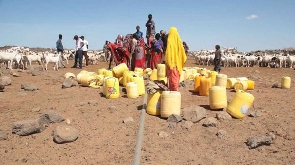The continual drought in Eastern Africa means that at least one in every five people you meet is unable to have their fill each day, signalling trouble even for those traditionally unaffected by scarcity of the precious commodity.
A new situational report by charity organisation Oxfam says that as many as 33.5 million people totally lack access to clean water, with numbers set to rise, as more failed rains are predicted to persist for a sixth consecutive season by May.
The drought means the price of clean water has skyrocketed in the Horn of Africa, with some areas experiencing a 400 percent increase since January 2021.
In northern Kenya, 95 percent of water sources have dried up in pastoral areas like Marsabit and Turkana, forcing water prices to rise and making it difficult for the 22.7 million people already facing acute hunger to access water.
Look for alternatives
Oxfam Africa Director, Fati N'Zi-Hassane said the situation means that countries in the Horn must must start looking for alternatives.
“The worsening hunger crisis in East Africa is a harsh reminder that we also need long-term solutions beyond immediate humanitarian relief, to help people cope with the recurrent shocks,” N'Zi-Hassane said.
“National governments must lead that change by investing in social protection, water infrastructure and supporting food producers,” she added.
So far, the drought has killed over 13 million livestock, dried up thousands of hectares of crops and driven 1.75 million people from their homes in search of water and food. In Somalia's Bay region, where 76,000 people are already facing famine-like conditions, water prices have more than doubled, forcing families to sell off what little essential possessions they have left or move from their homes in search of water.
The situation is dire, with hundreds of thousands of people now relying on emergency water trucking or unsafe and contaminated wells. Without clean water, people are at risk of easily contracting preventable diseases like acute watery diarrhoea and cholera.
Only a fifth the UN's $7 billion appeal for Ethiopia, Kenya, and Somalia has been funded to date, which will derail efforts to help millions of people on the brink.
Africa News of Thursday, 23 March 2023
Source: www.theeastafrican.co.ke













